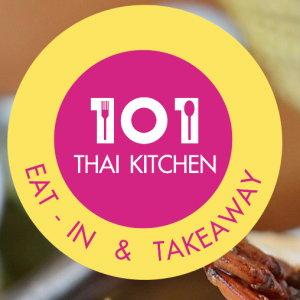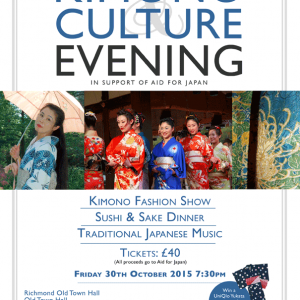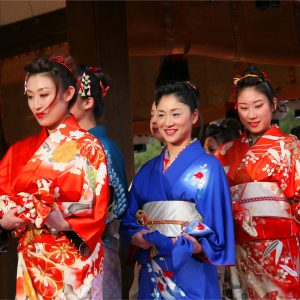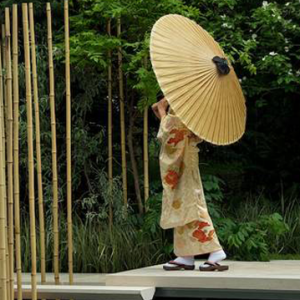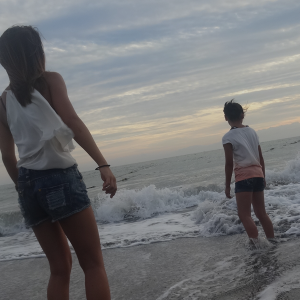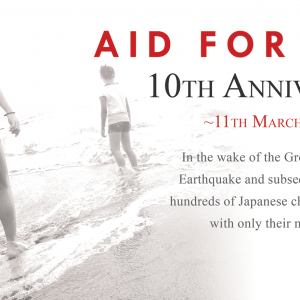2016 proved to be an eventful year for Aid For Japan, marked by the 5th Anniversary of the tragic earthquake/tsunami that had led to the charity’s formation back in 2011.
But 2016 brought with it some unexpected support and assistance from a variety of people who were willing to contribute to the charity’s work.
Author Benjamin Brook penned the novel Washing Over Me and donated proceeds from sales of the book to Aid For Japan in February of this year. Set against a backdrop of the Great East Japan Earthquake and Tsunami of 2011, Washing Over Me is a tale of loss and love, of the destructive power of nature and the resilience of humankind.
Last summer saw Aid For Japan take a team of volunteers to Japan as part of our annual residential course. The charity’s Japanese representative Sumika Hayakawa was on hand to help and provided her own personal take when they visited Fukushima: “After the residential course with orphans, the English volunteers came and stayed in my parent’s second house in Fukushima. While they stayed in Fukushima, Tom and Emile did a mini charity concert in the garden and the neighbourhood attended”.
With March marking the 5th Anniversary of the tragic event that had struck Japan in 2011, the date drew a lot of press interest and Aid For Japan was featured in coverage in newspapers such as The Telegraph and The Guardian.

Aid For Japan staged a special event that weaved in an exploration of Japanese culture alongside an exploration of Aid For Japan’s activities and goals. Among the guests, Zen Buddhist monk Julian Daizan Skinner Roshi. Daizan had compiled In Heaven’s River – an anthology of poems and carvings from the 17th Century Zen monk Enku. The life of Enku had some resonance with the events of 2011 as the monk had been orphaned when his mother was swept away in a flood.
John Evans and the students of the Battodo Fudokan dojo put on a martial arts display while Justin Senryu provided a reflective moment with a performance of his talents on the shakuhachi – the traditional Japanese flute. Refreshments were also on hand, kindly provided by local sushi outlet Maki, while a generous selection of onigiri and dorayaki was donated by The Japan Centre and Wagashi shop.
In April the charity organized a special hanami event in London’s Regent’s Park. Hanami is a traditional Japanese custom of viewing the cherry blossoms – and Aid For Japan (in association with its social group Bunkasai Club) staged its own hanami with a picnic.
April also saw Aid For Japan founder Akemi Solloway traveling to Japan with some of the charity’s volunteers to visit the tsunami orphans. Among the events was a cherry blossom viewing with the orphans in Hanamiyama, Fukushima.
Akemi summed up her feelings on the time that had passed: “It is now a year since we last met these children but, even so, I was so surprised how much taller they had grown and how much more mature they had become. It was most satisfying to see the results of our efforts and that they are growing up into good people”.
Although 5 years that had elapsed since the earthquake struck Japan’s eastern seaboard, the effects were still being felt this year. Despite a proud 140-year history, the Iwaisawa Elementary School in Fukushima was facing closure, as not enough children were available for classes any more due to the 2011 tragedy.
Meanwhile, May saw the Japanese ambassador to the UK retiring. Ambassador Hayashi had taken up his post shortly before the 2011 earthquake/tsunami tragedy hit Japan. Since then he has overseen the visit of the Emperor and Empress of Japan for the Queen’s Diamond Jubilee and was also Ambassador during the 2012 London Olympics.
It’s perhaps easy to forget that there are volunteers operating in the wake of tragedies like the 2011 earthquake. In May, we featured an interview with Jen Sno who is involved with It’s Not Just Mud, a relief organisation based in the Ishinomaki area. Jen compared her experiences in New Orleans following Hurricane Katrina – as well her experience of working with children in Tohoku and how they were living post-tsunami.

In July, Aid For Japan staged an event to invite people to take part in a traditional Japanese Tea Ceremony. The event was designed to help raise funds for the charity, but also helped to introduce people to a fascinating aspect of Japanese culture. The venue of choice was Wasoukan – a West London-based kimono boutique and matcha bar (www.wasoukan.eu). Over the course of 2 sessions, the team at Wasoukan took attendees through the careful process of the Tea Ceremony. This event raised £140 towards Aid For Japan’s efforts to support the orphans in Japan, but also brought a small slice of Japanese culture to London at the same time.
One of Aid For Japan’s regular activities is to bring some of the orphans back to the UK each year. Aid For Japan has made a point of organising UK visits for the orphans on a regular basis since 2011. For children that have lost their parents, this is an important step that not only broadens their view of the world but also reminds them that the world remembers them.
As part of 2016’s plan, three young volunteers from the UK flew out to Japan. This was partly to help raise funds for the charity – and also raise awareness of its goals. David, Alex and Zak (who are all in their teens) invited people to track their progress on a special blog which had regular updates on their travels.
Hiirocon is one of the more recent anime conventions to become established in the UK. Based in Reading, the event based its title around the Japanese term for the colour of fire hiiro. Aid For Japan were kindly given a space at the 2016 event where enthusiasts of anime, manga and geek culture generally were able to learn a little bit about the charity’s goals. Angela, one of Aid For Japan’s regular volunteers, helped as liaison at the event and provided her own thoughts on the experience: “Akemi Solloway gave a talk about Japanese Culture. It was interesting and amazing. There were many anime fans in the audience who also showed an interest in what Akemi had to say and the Aid for Japan leaflets that I handed out to them. It was a fun enjoyable day!”

Summer also saw our volunteers returning from Japan – along with some of the Japanese orphans. The charity decided to stage a special event to welcome them at St John The Baptist in leafy Kingston Vale where a tasty range of barbecued food was available. But there was also a Japanese element to the refreshments with onigiri rice balls and doryaki snacks. David, Alex and Zak, who were our volunteers in Japan, gave a presentation to talk a little about their adventures, before doing a brief musical performance, which included Beatles cover songs. To finish off, Aid For Japan’s founder Akemi Solloway did a traditional Japanese dance.
The event helped to raise over £500 towards Aid For Japan’s mission with the costs of the evening greatly reduced by the kind donation of food by David’s parents and Japanese snacks provided by the Japan Centre.
A new anime film titled Your Name by noted director Makoto Shinkai managed to capture the imagination of the world in September. Elements of the anime drew upon the experience of Japan in the wake of the deadly 2011 earthquake. Shinkai said he used the film to reflect a sentiment that many, including himself, shared – that a disaster could strike at any moment.
Japan’s approach to disaster historically differs from the ways that many other countries document such events. A fascinating article looking at the absence of earthquakes in classic Japanese literature offered an intriguing window on the Japanese mind.
The splendour of Strawberry Hill House was the setting for a special talk on the History Of The Kimono that was staged by Akemi in the autumn. The Japanese word kimono (着物) translates to “thing to wear” (着 ki “wear” and 物 mono “thing”) but this simple definition is eclipsed by the many different variations and styles that the kimono encompasses. Akemi’s talk provided some insight into the kimono, and also helped raise funds for the charity at the same time.

One of Aid For Japan’s regular tasks revolves around visits to Japan to forge partnerships and also to help raise awareness of the charity and its goals. In the autumn months, Aid For Japan founder Akemi Solloway flew out with a busy schedule of stops planned including visits to Nara, Kyoto and Himeji. This also included liaising with the charity’s Japanese representative Sumika, who is responsible for many of the issues that Aid For Japan has to deal with domestically.
November proved to be an anxious month when news came in that a quake had again struck Japan off the eastern coast. The quake struck near Fukushima triggering initial warnings of 3m (9.8ft) high waves. Thousands were asked to evacuate the area and minor injuries were reported. Luckily, the waves which eventually hit the coast were much smaller.
Elsewhere, Aid For Japan were involved with Manchester’s popular Doki Doki event – an annual event celebrating both traditional and modern Japanese culture. As well as giving a talk about the charity, Akemi was also invited to take part in a panel answering questions from people interested in traveling to Japan. She also presented a special talk discussing Japanese history.
One of the final activities that Aid For Japan engages in occurs in December when a selection of presents for the orphans are dutifully gathered and wrapped. With the presents then shipped out directly to Japan it’s a comforting thought that the orphans would at least have some things to smile about at Christmas.
Much of Aid For Japan’s activities this year would not have been possible without the tireless work and dedication of the charity’s small team of volunteers and helpers. This includes Angela Shaffer, Roberta Roccato, Sumika Hayakawa, Isabelle Demaude, Paul Algar, Yussif Osman, Sei Nakatani, Richard Pennington, David, Alex & Zak, Tom, Emile and Misato as well as all the other people that have assisted throughout 2016.
Aid For Japan would also like to extend its grateful thanks to Timo Hebditch, Benjamin Brook, Doki Doki, Genki Gear, Hiirocon, the staff at Wasoukan, the team at St John The Baptist, John Evans and the students of the Battodo Fudokan dojo, Julian Daizan Skinner Roshi, Justin Senryu and Angus Turvill, Maki, the Japan Centre and also to the staff at WeWorks for their help and assistance.


